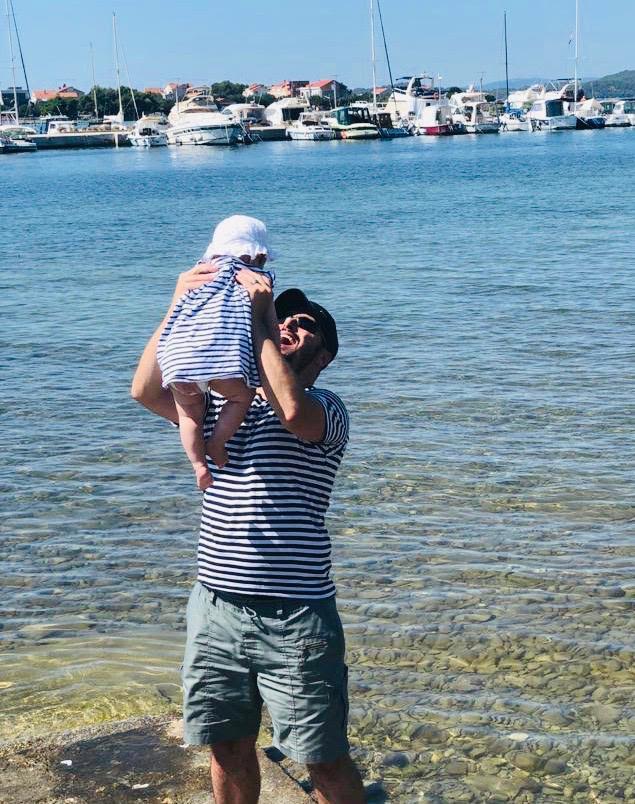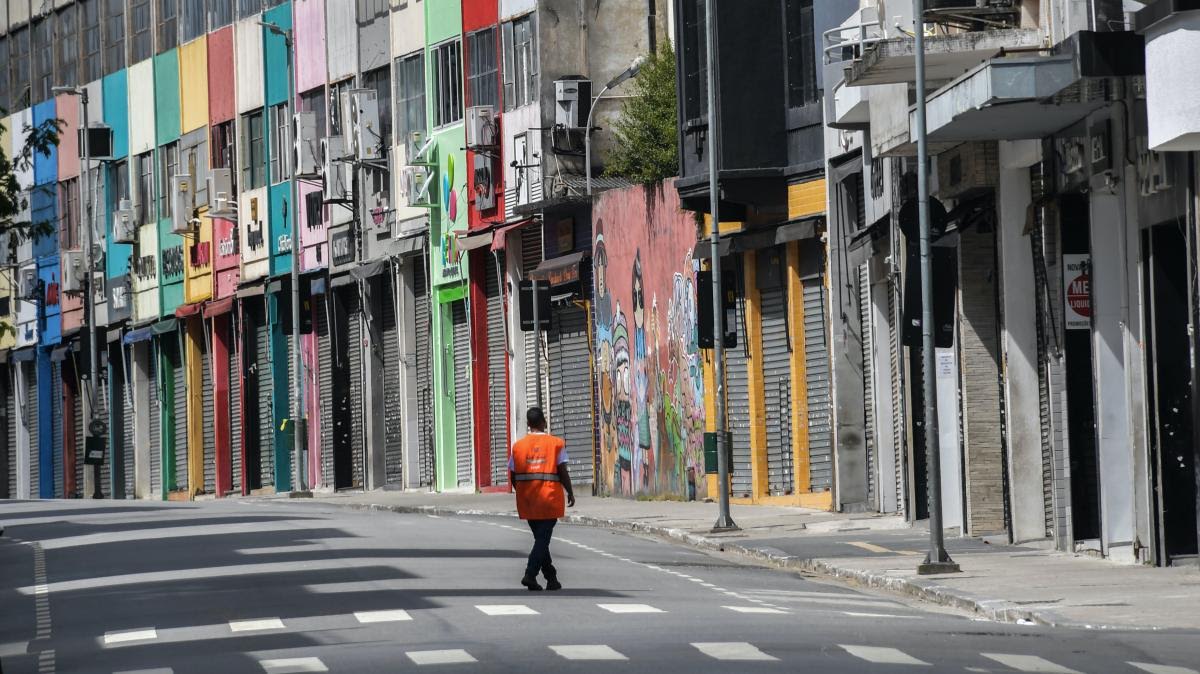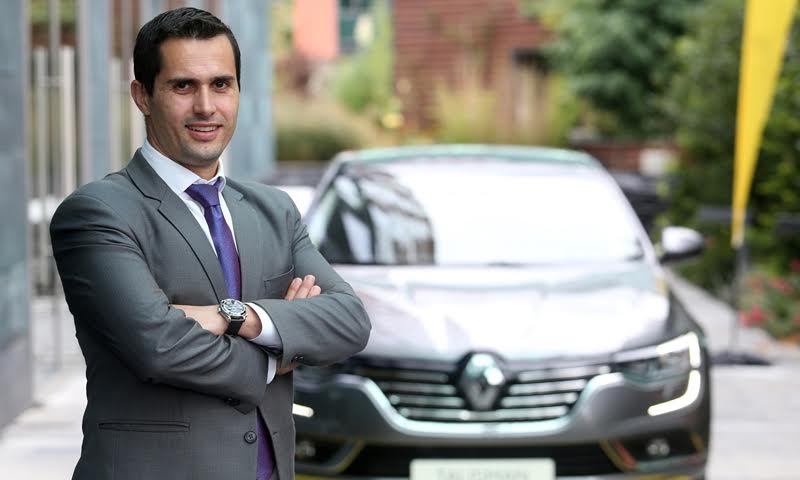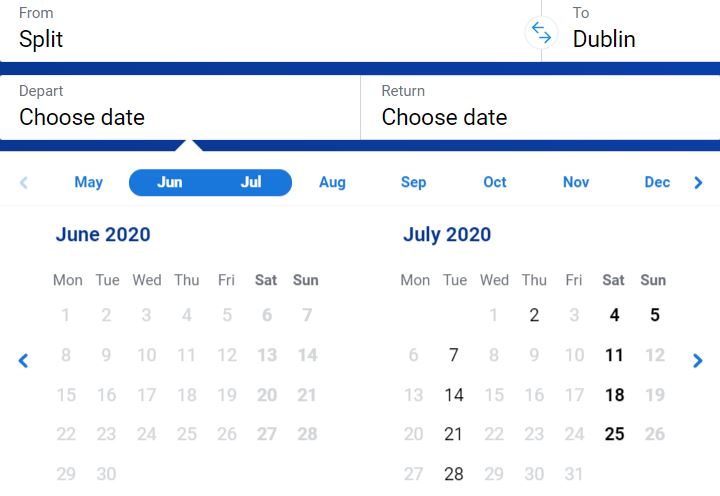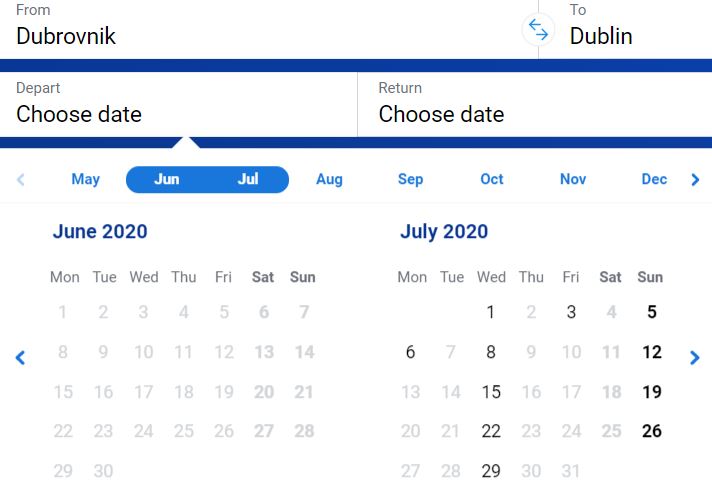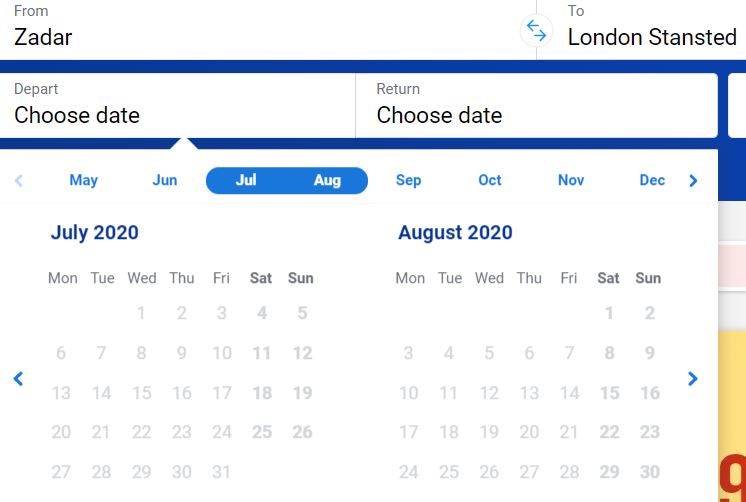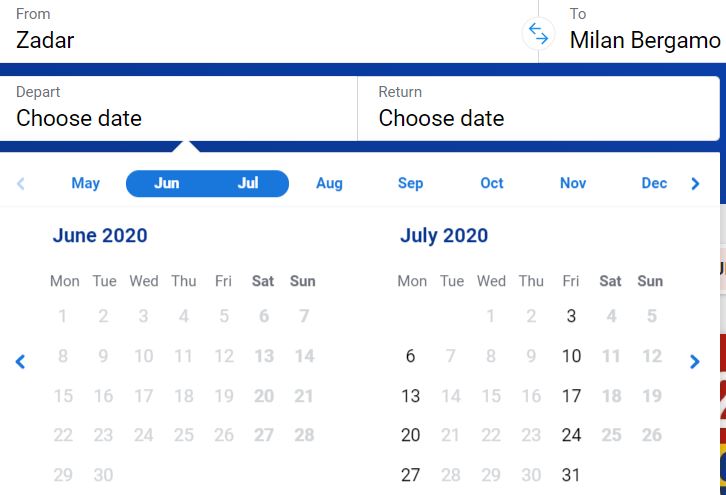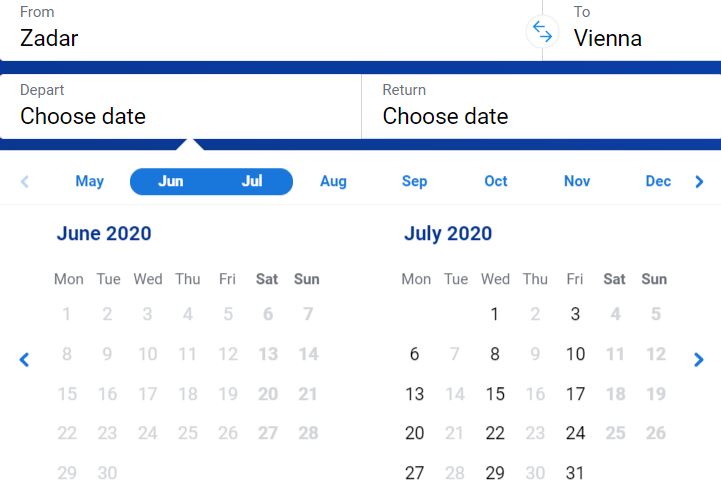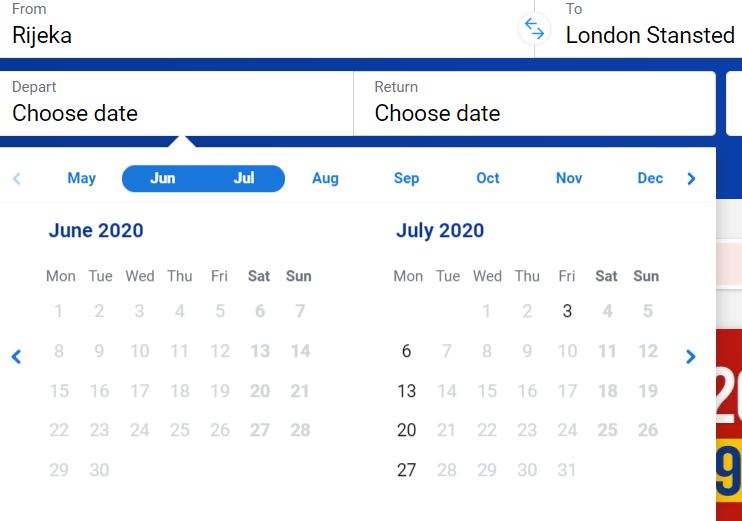Diary of a Split Tour Guide in the Age of Corona - Part 6
May 12, 2020 - Part 6 of Ivica Profaca's Diary of a Split Tour Guide in the Age of Corona - you can start at the beginning here.
There is not so much normal in "the New Normal". Following the stage three of softening anti-COVID measures (Total Croatia News extensively updates all info on the pandemic in Croatia), I wrote a blog for the Tourist Board of Split with the hope that opening things might really move the whole society up, especially the economy. In some ways it does. Among other things, it's possible to travel around Croatia, in some cases even crossing the national border without a two-week quarantine. You can now have a drink, or a meal in bars and restaurants, with some restrictions, and get together with up to 40 people. There are flights, buses and trains in Croatia, hopefully there will be some international ones soon, too. British Airways and Ryanair already announced their flights from June, easyJet never took their flights off their website. Hotel openings were announced, although not on a very big scale. Maybe it's not great, but it looks good, at least as a start. The situation with the virus is also promising, even with the latest outbreak on the island of Brač.
All this brought hope for different segments of the tourism industry that there might be something out of this year's season. Shops, cafés, bars, restaurants, etc. might really have some traffic. It's miles away from what they all got used to, and if you ask people in these segments they will tell you that the future is not really bright, maybe just black turned into grey.
On the other hand, what does all this mean for guides? Much less than to those in the previous paragraph. Along with some other fellow guides, I was asked by T-portal reporter about prospects of this season, and the verdict is pretty much unanimous. We can't hope for anything serious before September. A wild guess is that most tourists will be those from other parts of Croatia. They will bring some work to accommodations, or to those selling drinks and food. Guides? In years of doing this I can hardly remember if I ever had a request from Croatian tourists for a tour. Maybe it's about saving money for other stuff, or maybe people coming on vacation usually do sightseeing on their own. This is not an objection, just a fact. After all, even when I travel abroad I do the same; do my homework, and then research on my own. It can't be compared with guidance by an experienced local guide, and I enjoyed those few times when I hired someone, but those are the usual habits.
In the last few days there were also some events which make relying on September and October too optimistic. Firstly, all the main tourism markets are still COVID-active, some of them extremely active. On a day when I write this, the number of confirmed cases in Germany tripled, the UK passed over Italy and France in both cases and deaths, plus they have more deaths than Spain. As expected, the epidemic in the USA is still raging. Border openings? Only two days after Croatia announced that passengers coming from other EU countries will not need a quarantine, a plane from Frankfurt brought at least a dozen new cases, possibly more still waiting to be confirmed. With the regime softening in most European countries in the last week or so, we still need to wait for some time before it will be proven that everything went well.
Almost at the same time when some airlines announced re-launching of their flights (with others giving up their plans), bad news came from cruise companies, which bring many clients to guides. There are no ships cruising around at least till the end of June, some companies berthed their vessels till the end of July. Holland American Line made a step forward, or backwards, and made a move that might become a faith for the whole industry; they simply cancelled their operation for the whole of 2020.
On the home front, it means that the number of cancelled jobs for this year is now officially bigger than those still alive, even with included bookings already postponed to 2021. On this date in 2019 I had a few dozen jobs already done, this year it's five since the New Year. Of those five, three were brought in by friends who wanted to do a favour to someone. Now even big September hopes look more and more like a bubble with few new cancelations in that month. Months before September are already almost empty. State support called Program of saving jobs affected by COVID ends next month, and the situation won't be better than when we all applied for it two months ago. Actually, it's even worse. Not to mention that the danger of COVID is still present, and safety must come first. I'm not sure I would be delighted with the prospect of passing through possible crowds created by further regime softening, not to mention ideas of huge events like Ultra Europe, with people coming mostly from those countries I mentioned before in this writing.
So, to conclude - the possibility of putting big X across 2020 is bigger and bigger.
We will be following Ivica Profaca's journey through the rocky weeks ahead.
If you find yourself in Split, or are planning a post-corona visit, check out his range of tours on his website - families, look out for the kids tour of Diocletian Palace. It will not only entertain your kids while allowing you to absorb this unique UNESCO World Heritage Site, but it will bring out the inner child in you too. Learn more about it here.
You can read other parts of Ivica's Split Tour Guide in the Age of Corona series here.
(To be continued)
When Distance Becomes Viral: One Family’s Flight from Delhi to Zagreb
May 12, 2020 - TCN is delighted to welcome Jennifer Barsky to TCN, whose arrival and first few days in Zagreb from Delhi in mid-March is quite a story. Welcome, Number 153!
Living apart from loved ones is difficult under any circumstances, but the pandemic has only made distance all the more challenging and complex. In July 2019, my husband accepted a position in Zagreb. At the time, we had already been in India for two years and with our son starting high school and our youngest daughter transitioning to middle school, the kids were adamant they return to Delhi in the fall to begin the year with their friends, even if it meant a year largely apart from their father.
For the children, little changed. Their days continued to consist of school, friends, and activities and I relished the opportunity to do more yoga and continue our amazing adventures around India. For my husband, it meant new patterns away from us, weekends now spent in the office, and seemingly endless hours on planes.
Our new ‘normal ’would change again with the onset of coronavirus. With my husband’s mother in Spain, the uncomfortable tension of where things were leading was already building by February. Four people had tested positive in South India, but the situation seemed under control so together with a friend visiting from Canada we hopped on a plane for a weekend in Kerala armed with masks and Lysol wipes. My husband was still set to return to India for work and to spend March break together with my brother who would join us from Boston for trekking in the North. We were still making plans to drive in June from Croatia through Italy and France on our way to Spain for summer vacation.
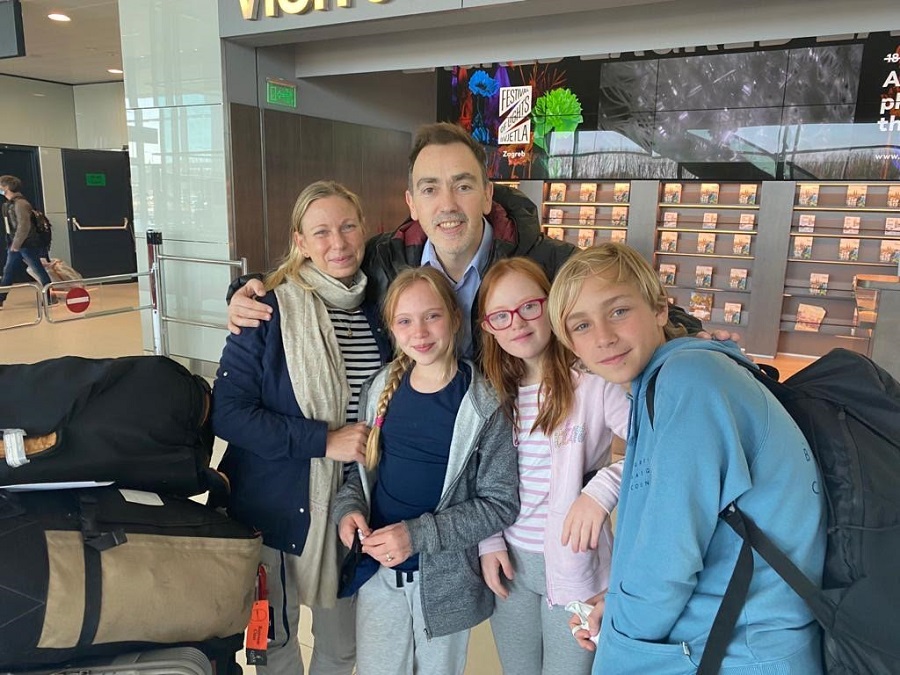
Suddenly, it felt as though the best-laid plans were only traps, with doors slamming all around us. On March 13th, Delhi closed schools through the 31st and my chat groups filled with dissenting views on whether the American school should follow suit. The definition of safety and what was best for our children became fluid. My daughters’ play was canceled, but parent-teacher signups continued. Borders were closing and death tolls in Italy and Spain were mounting daily. My brother canceled his trip, concerned he could end up in one of India’s military quarantine camps
The swirling of rumors, advice, and directives accelerated. Flights out of India canceled. Airports now hotbeds of the virus. New travel advisories issued by the day. Visas canceled for France, Spain, and Germany. The children’s school closed until March 27th. Hand sanitizer and gloves sold out. Calls with my husband became more urgent.
Amid the seeming chaos, life was calm and took on yet a new ‘normal’. Quiet days, low pollution, the trees full of squawking parrots, gardens ablaze with color, and a light breeze. I began teaching socially distanced yoga in the park, the kids organized school working sessions with friends. We were happy. But we were also apart. Then, March 12th, a new travel directive virtually erased our visas from the pages of our passports. If we left now, we would be unable to return until at least April 13th. The kids wanted to stay. My husband was desperate we be together before the window slammed tight and we risked months apart. Maybe he should come here, friends said. We began looking at Zagreb-Delhi flights.
Amidst the indecision, a flurry of calls and messages. A friend and doctor from Montreal. You need to leave now. Come to Canada where you will be safe. My sister who drove with her daughter at 5 am across the Spanish-French border to reunite with her husband before it sealed. Leave now. With 1.3 billion people and an unknown infection spreading like dust storms across communities, there is no telling where this is going. You need to be together.
I buy a ticket for Monday, March 16th and we begin packing. I’m unsettled. It feels counterintuitive to fly from India’s relative calm into Europe’s eye of the storm, but Croatia seems an oasis for the moment. Don’t worry, you will be back when school opens, I tell the kids, unsure our visas would be honored for our anticipated April return. They are sad to leave friends, our dog, but also excited to have a vacation in their soon to be Croatian home.
Monday comes, but when I go online to check-in, I realize the flight had left with the sunrise that morning. I have spent my career on a plane and have never missed a flight. It hits me like a punch in the stomach. I get online and start searching. Flights are few and far between and prices more than double. It’s not even four am for my husband. I need to make a decision. The earliest I can get us out is Thursday with a 14-hour layover in Doha. I imagine the tension, exposure, exhaustion, but I can no longer shelter the children from a cross-continent transition in flight. I buy the tickets.
When my husband wakes up, he is increasingly desperate. More border closings. “Buy a ticket for tomorrow,” he says calmly but I can hear the concern in his voice. I am trembling as we look at different dates, different options, flight prices increasing every time I open the browser. “Just buy it,” he urges. I check the times, type my credit card number, and hit purchase. The itinerary comes back confirmed, but it is the wrong day. The brave face I have kept for the kids these past weeks evaporates. “I can’t do it anymore,” I shout. He listens and calms me, but I can feel him pacing, helpless across the distance.
This time we pack more bags. The kids slowly coming to terms that we may be gone longer than they anticipated. I stock up on our favorite things to keep India close and ensure some continuity as we tear them from their lives. Telephone goodbyes. We will see each other soon.
The airport is unexpectedly smooth. Masks, Lysol wipes, gloves, sanitizer. I am obsessive. The kids feel safe with me. We arrive in Doha. It feels empty but full of life. Young migrant workers from around the world, from India, man the airport, smiling greetings.
Hours go by surprisingly fast and it is time to board. As we approach the gate there are people still seated, others are waving papers at the agent. My husband calls to make sure we are on board as I present our passports. Three Spanish for the children and my Canadian. The rules had changed while we were in transit. I am refused boarding. Relatives of EU citizens are no longer allowed in. I present a government letter advising my husband is a resident and we are joining him. No amount of discussion will change their minds. Should I board the kids and try to get a flight to my native Montreal? The flight closes together with the distance for those onboard. We are still in Doha.
The walk to the transit desks feels miles away. The kids trade stories of the Himalayas with our Nepali escort. On arrival, a young Kenyan agent listens patiently to our story. “There is a flight in six hours, but will need written confirmation they will allow you entry,” she tells me. My husband is on the phone with the head of his office as they desperately try to obtain permission for us to travel. It’s the middle of the night. The Zagreb airport police confirm we will be accepted but there is no written confirmation. “Don’t worry,” the agent reassures me. “I will stay past my shift end to ensure you get on the plane.” I want to hug her, but the virus says no.
I take the kids to lie down on some chairs. They are exhausted and scared. Hours pass. The airport is sealed so we cannot travel into Doha. Authorities waive the rule allowing us to stay in the airport beyond the 24-hour limit. I comfort a young woman from Namibia, unable to reach her mother since they closed the airspace over South Africa. A 14-year old boy alone, trying to reach his family on vacation in the Maldives. We are just one of the so many stories of separation. Of distance.
Only 30 minutes before the flight is set to leave, they rush to tell us we have been confirmed to travel. We race to the gate only to be denied boarding again by security. They did not receive a message. This time they hold the flight and the message reaches in time. The bus idles for what seems like hours before we finally board. Masks, Lysol wipes, hand sanitizer. The last call to my husband. Cautious relief. We are on our way.
The kids relax and watch a movie. I practice pranayama to calm my mind. We arrive. The kids are excited but still nervous. They want so much to enjoy these first steps into the new country they will soon call home. I am prepared for the entry process to be slow. We present our papers but are turned back. The distance is nothing but meters now from my husband waiting on the other side of immigration, but unable to step into Croatia, we might as well still be in India. More calls, more committed people working tirelessly to help free us from no man’s land.
Almost four hours after we disembarked, our passports are stamped, we collect our luggage and step across the distance into my husband’s embrace. Suddenly, near 40 hours of travel dissolves. We quarantine happily in our new house. The kids wake to snow for the first time. The coronavirus lockdown is announced but we don’t mind. We are safe, together and grateful. We sleep peacefully until just three days after our arrival we awake to the house, our world, shaking beneath us again. This time, a 5.3 magnitude earthquake just 7 kilometers north of Zagreb, the first in 140 years. We huddle outside in the cold, a sensation of incredulity, a deep sense of fear of what next. Many lose their homes. We are lucky.
We leave our shoes, coats and hats close to the door and every one of the more than 100 aftershocks over the coming weeks sends us running, hearts in our throats. As time passes, the tremors diminish, and our sense of security returns. Our sense of gratitude throughout remains unshaken.
As I write this, Croatia takes steps to open and India’s lockdown has been extended another 14 days. Thousands of the migrants who took to Delhi’s streets when it first began remain stranded, some starving. Had we left one day later or not experienced the compassionate commitment of so many, we would still be there, awaiting news and watching temperatures and uncertainty rise. Here, the garden we planted a month ago is blossoming. We are home.
For more human stories of expats in Croatia, Croatians abroad, and those somewhere in between, check out the dedicated TCN section.
Jennifer Barsky is an international development professional, health coach, and certified yoga instructor. Originally from Montreal, Canada, she now lives in Zagreb with her husband and three children. She can be reached at This email address is being protected from spambots. You need JavaScript enabled to view it.
Medical Tourism in the Corona Era: New Procedures at Bagatin Clinic
May 12, 2020 - Medical tourism in the corona age. Bagatin Clinic's inspirational CEO Ognjen Bagatin on how his award-winning clinic is serving its clients safely in the new reality.
It seems an age since I was in Berlin in early December watching Ognjen Bagatin and Andrea Stipanic of Bagatin Clinic take the stage at the International Medical Travel Journal awards for Best International Cosmetic Surgery Clinic 2019.
Although it was less than six months ago, such a lot has happened since then that it really does seem iike a different era.
But some things never change, and that includes Ognjen Bagatin's positivity and determination to succeed and offer his customers the very best.
Bagatin Clinic opened its doors on May 4 after the recent lockdown, and Ognjen found time to explain how procedures will work at Bagatin Clinic for the moment, as well as this excellent video explanation.
The safety and health of our clients and patients and all of our medical and non-medical staff, has always been our primary concern.
In addition to this priority, since January, our specially constituted Expert Committee has been closely monitoring the situation with the cornoravirus (COVID-19), communicating daily with the competent authorities of the Republic of Croatia and thoroughly following the instructions of the World Health Organization.
Transparency of information within the Clinic, additional education and, above all, the personal responsibility of our employees, has resulted in our readiness for all the challenges that have come before us, but also for those who are yet to come.
For security reasons, and following the recommendation of the competent authorities, we closed Bagatin Clinic for one month. It was a very difficult decision, but I know it was primarily the right decision.
And now, with the security measures being mitigated and with a very optimistic health situation in our beautiful Croatia, with a big smile on my face, I can announce the reopening of the Clinic.
On May 4th, our doors have reopened!
Of course, there is simply no room for relaxation in this fight against the invisible enemy. We still have to think first and foremost about your and our safety. Therefore, we have adopted new rules of business and laid down basic measures that we will follow in our daily work. And I invite all of you to be cooperative and responsible as well.
We continue to follow all the recommendations issued by the Ministry of Health of the Republic of Croatia, the Croatian Medical Chamber, the Croatian Chamber of Dental Medicine and the Croatian Institute of Public Health.
Allow me to present to you all the additional safety measures and hygiene protocols in Bagatin Clinic which have been implemented for the purpose of protecting all of us form the disease caused by the COVID-19.
- While setting up and confirming appointments, our contact centre operators go through a set of questions with each client so that we can identify potential health and/or infection risks. These questions are related to trips to at-risk areas in the last 14 days, contacts with persons infected with COVID-19, whether they have been self-isolated or quarantined for the past 14 days, and whether they have had a fever or a respiratory problem in the last 14 days.
- Prior to arrival, we inform the patient, by phone, of the protocols required to arrive at the Bagatin Clinic locations, and instruct clients / patients to come unaccompanied and with their own face mask.
- At the entrance door of each of our locations, patients and clients are provided with information on preventative measures to protect against COVID-19.
- At the entrance to the premises of the Clinic, a bactericidal and viricidal barrier is provided for the patient's footwear (a fabric soaked with disinfectant that changes every 3 hours).
- Upon entrance, it is obligatory to disinfect hands with the provided disinfectant agents. The product is also available in all the toilets, encouraging patients and clients to disinfect their hands after each new contact with different surfaces.
- We regularly and continuously keep our premises clean and disinfected, and pay special attention to the surfaces with which employees and clients are most often in contact: door handles, worktops, POS appliances, customer toilet, faucets, handrails, waiting areas.
- In addition, sufficient time is provided between patient appointments to allow for additional disinfection and sterilization of the premises, and the movement of clients and healthcare staff across the Clinic's premises is minimized.
- The extended pause between appointments also ensures a reduced fluctuation of clients and patients in the waiting room and allows for the social distancing rules to be followed, that is, close contact is avoided and the distance of at least 2 meters is maintained.
- The reception area is separated by a Plexiglas barrier and the reception staff is additionally protected by disposable gloves and face masks.
- Our health care professionals use all necessary protective equipment in their work and have received additional training in the proper use of personal protective equipment: FFP3 / N95 masks, disposable sterile or non-sterile gloves (depending on the type of procedure), transparent safety glasses or visors for personnel wearing prescription glasses, surgical cap and disposable coat.
- After each client and patient, the utensils, appliances and instruments are thoroughly disinfected and sterilized or disposed of, and the rooms and offices are regularly ventilated.
- Operating rooms and dental surgeries are equipped with UV lamps with ozone of adequate strength according to the quadrature of the space, which ensure disinfection and sterilization of the entire surface.
We will do everything in our power to ensure you a comfortable and safe stay at Bagatin Clinic with, of course, the first-rate service you are accustomed to. We are at your disposal for any questions, concerns, advice, even fears…
We invite you to be responsible toward yourself and others. Please be considerate of the new situation and respect the measures that are there to protect the health of all of us. We can only do this together!
The doors to your favourite beauty destinations in Zagreb and Split have been open since May 4th.
I look forward to seeing you!
Ognjen Bagatin
CEO of Bagatin Clinic
You can learn more about the services of Bagatin Clinic on the official website.
For more on the Croatian medical tourism story, follow the dedicated TCN section.
Corona Voices in the Croatian Diaspora: Frano Susnjara from Zagreb in Brazil
April 18, 2020 - With as many Croatians living abroad as in the Homeland, what are the diaspora experiences of self-isolation? In the 9th in our series, Corona Voices in the Croatian Diaspora, here is Frano Susnjara in Sao Paulo in Brazil and originally from Zagreb.
Last month TCN started a feature series called Foreigner Self-Isolation In Croatia: Do You Feel Safer? I can honestly say we have never had such a response or so many incredible contributions. The countries of origin of these expats in Croatia literally from all over the world. So far we have had submissions from expats from Romania, USA, Ireland, UK, Mexico, Argentina, Spain, Singapore, Holland, Canada, India, Hong Kong, Venezuela, Latvia, China, Honduras, Hungary, Moldova, New Zealand, Japan and Germany. You can see all their stories here.
Given the success of the series (still going strong) and large interest, it made sense to expand it to look at this from another angle - how Croatians abroad are coping where they are. If you would like to contribute your story to Corona Voices in the Croatian Diaspora, please find the submission guidelines below. Next up, Frano Susnjara in Sao Paolo in Brazil and originally from Zagreb.
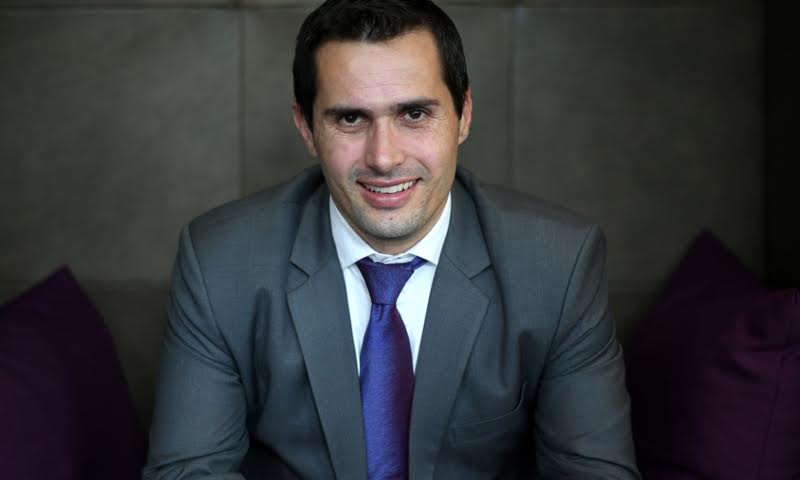
Firstly, how are you? Are you alone/with someone? Tell us a little about your situation and sanity levels.
Hi, firstly I would like to thank Total Croatia News for the interest and a very interesting topic. Also, I’d like to send my best regards to all your readers hoping that they and their close ones are ok in this specific context.
Different countries bring different experiences. We are ok. Branka, my spouse and myself are in Sao Paulo since January with our two children. We came to Brazil from Hong Kong in January this year, very motivated to discover this beautiful country and the continent.
Unfortunately, since the 15th of March we are closed in our flat. Luckily, we are living in a good area of Sao Paulo, therefore with good availability of public or private hospitals and no risky areas from criminality point of view.
When did you realize that coronavirus was going to be a big issue?
To be very honest, after living in Hong Kong and understanding the impacts that SARS left in early 2000, hearing the news end of December we thought: „ouch, this might be a rollercoaster”. Still, we hoped, as everyone else I suppose, that it might be a short effect virus ending by the summer.
When did you realize that coronavirus was going to be a big issue in Brazil in particular?
We see how the world press, including in Croatia, perceives Brazil. Yet, to be factual, we were in lockdown since the middle of March roughly at the same time as Croatia and other countries in Europe. The first case in Brazil happened at the same time as in Croatia.
Still, in the middle of April, we saw that Europe started to „flatten the curve“. It wasn't and still isn't the case in Brazil.
Give us a timeline on when and how life changed.
It was the weekend of the 15th. We heard that one of the kids in my son's school got infected. We stopped sending him to school. Two days later, during our Board meeting, we decided to switch to the home office. Suddenly, everything changed. As we were still settling in, with the flat, stuff from Hong Kong, looking for the right stores, we needed to downsize quickly the expectations for the future weeks and months. From full discovery to full contraction in 48h.
Tell us about your day. Do you/can you leave your apartment?
Well, I have a 16 months old wakeup call that „rings the bells“ at 05:30 calling “tataaa”..so my day starts with her. Then, after making breakfast for them, I connect to various meetings with France that works until 13:00 (5h difference). We continue the day with meetings with LatAm countries including Mexico which is -3h vs Sao Paulo. So, the day is cut in different time zones. In the time pockets between the meetings, we focus on the kids, to facilitate them the new context and entertain them with creative work or activities.
We can leave the flat to pick up the groceries or to go for a run/walk. As museums, restaurants, cultural facilities are closed including cities around Sao Paulo there is not much interest in going out either.
How are the authorities doing at handling the situation?
The state of Sao Paulo reacted, as said, very early and are monitoring the situation. The current saturation of the ICU is 70% for public hospitals and roughly 50% for private ones. In some states of Brazil, it is even higher than 90% and rising. Still after 50 days, we see that the people are „relaxing“ the discipline and lately the respect of the quarantine is 48% vs expected 70% or higher. The state of Sao Paulo imposed extra bans for transport and mandatory mask-wearing.
You obviously keep an eye on your homeland. What is your impression of the way Croatia is dealing with the crisis?
Well, I can see various comments about Croatian performance in Croatian media and social networks. Nothing is perfect of course but I would like to share to our folks in Croatia the envy we feel when we see how Croatia has been fighting with success this pandemic. Regardless of the issues we may confront, we should feel very proud and happy to see how well we are „playing this match “. There are little portions of countries doing so.
Even in Brazil Croatia is mentioned in the positive lights of countries who fought greatly this pandemic.
Compare and contrast the responses of Croatia and Brazil. Who is doing what better?
Firstly, in Croatia and in Brazil we need to be grateful that there were no shortages in any kind of food, beverage or other grocery supplies. It does happen in some countries and let’s not forget it.
The context is slightly different, but regardless of the different variables, I feel that in Croatia we managed to respect better the confinement. As if the 90's war experience has left certain respect for extraordinary situations and facilitated the alignment of the population in order to respect the measures. Now, we should collect the benefits of it and facilitate the quick reactivation of the economy and set free the creativity to adapt quickly and faster than others to the new “normal”. This is a huge opportunity for Croatia, I hope we do not miss it as these opportunities happened 2-3 times in the last 30 years.
What's the one thing you wish you had taken with you into self-isolation?
We cannot complain much. Everything remains available and deliveries are working great so it would be hard to specify. The food in Brazil is like Croatian food, especially Sao Paulo with more than 60% of the population with Italian roots. Ci sentiamo come a casa.
One thing you have learned about yourself, and one thing you have learned about others during this crisis.
It is an easy one. My work life includes a lot of travelling. I was saying to Branka, like, great I will finally have more time to read and catch up on some other passions like guitar etc...well it did happen, but only partially. Times flies wherever you are…so keeping the focus on the most important matters remains the main principle.
What I did learn about the others is that we didn’t lose our biggest values as humans, as they care for the other ones. So many positive initiatives in Brazil or in Croatia to help the ones in need fills me with pride. When I see the actions that a couple of young Croatian ladies from Holland initiated with Fond 5.5, how the actions “Vratimo Palčiće u Petrovu” is managing to help and support, it makes me proud.
Also, on my company side, I am happy how our dealers, engineers and employees in Colombia, Argentina, Brazil, Mexico and rest of the world reacted using all kind of resources to support the health, security and other services to facilitate these times putting the human in the main focus make me proud to work in the community that I am part now.
If you could be self-isolating in Croatia, where would it be, and why?
I would pick 3-4 places. Zagreb where our life, friends and family are. Compact, perfectly balanced for family, active and joyful life.
Croatian coast cities like Senj, Sukošan or the islands like Hvar or Vis. After living in megacities like Paris, Hong Kong or Sao Paulo you value the well-balanced fit in with the nature and the peace that surrounds those cities with a strong smell of salt in the air. Yes, homesickness leaves some marks. ?
Thanks, Frano. Stay safe and see you on the other side. You can see all the stories in both this diaspora series, and the one on expats in Croatia on this link.
TCN is starting a new feature series on Croatian diaspora experiences of sitting out COVID-19 abroad and comparing your experiences to the situation in Croatia. If you would like to contribute, the questions are below. Please also include a para about yourself and where you are from, and a link to your website if you would like. Please also send 3-4 photos minimum to This email address is being protected from spambots. You need JavaScript enabled to view it. Subject Corona Diaspora
If you would be interested to record a video version for our partners www.rplus.video please let us know in the email. Thanks and stay safe.
Self-Isolation Voices from the Diaspora
Firstly, how are you? Are you alone/with someone? Tell us a little about your situation and sanity levels.
When did you realise that corona was going to be a big issue?
When did you realise that corona was going to be a big issue in New York in particular?
Give us a timeline on when and how life changed.
Tell us about your day. Do you/can you leave your apartment?
How are the authorities doing at handling the situation?
You obviously keep an eye on your homeland. What is your impression of the way Croatia is dealing with the crisis?
Compare and contrast the responses of Croatia and USA. Who is doing what better?
What about official communications from the authorities, compared to your home country?
What's the one thing you wish you had taken with you into self-isolation?
One thing you have learned about yourself, and one thing you have learned about others during this crisis.
If you could be self-isolating in Croatia, where would it be, and why?
TCN has recently become a partner in Robert Tomic Zuber's new R+ video channel, initially telling stories about corona experiences. You can see the first TCN contribution from this morning, my video from Jelsa talking about the realities of running a news portal in the corona era below. If you would like to also submit a video interview, please find Robert's guidelines below
VIDEO RECORDING GUIDE
The video footage should be recorded so that the cell phone is turned horizontally (landscape mode).
There are several rules for television and video news:- length is not a virtue- a picture speaks more than a thousand words
In short, this would mean that your story should not last more than 90 seconds and that everything you say in the report should be shown by video (for example, if you talk about empty streets, we should see those empty streets, etc.).
How to do it with your cell phone? First, use a selfie camera to record yourself telling your story for about a minute and a half. Ideally, it would be taken in the exterior, except in situations where you are reporting on things in the interior (quarantine, hospital, self-isolation, etc.). Also, when shooting, move freely, make sure everything is not static.
After you have recorded your report, you should capture footage that will tell your story with a picture, such as an earlier example with empty streets.
One of the basic rules of TV journalism is that the story is told in the same way as a journalist with his text. Therefore, we ask you for additional effort. Because we work in a very specific situation, sometimes you may not be able to capture footage for each sentence of the report. In this case, record the details on the streets: people walking, the main features of the city where you live, inscriptions on the windows related to the virus, etc.
The same rules apply if you are shooting a story from your apartment, self-isolation, quarantine. We also need you to capture footage that describes your story.
When shooting frames to cover your reports, it is important that you change the angle of the shot (in other words, shoot that empty street from several angles). Also, when shooting a detail, count at least five seconds before removing the camera to another detail.
The material should be about 5 minutes long (90 seconds of your report + frames to cover your story).
After recording everything, send us to Zagreb, preferably via WeTransfer to This email address is being protected from spambots. You need JavaScript enabled to view it.
Ryanair to Croatia Planned for July: Zadar, Split, Dubrovnik, Rijeka, Pula Flight Info
May 12, 2020 - As CEO Michael O'Leary announces the resumption of 40% of its schedule from July 1, what does that mean for flights with Ryanair to Croatia?
It has been quite a day for flight news for Croatia so far, and it is not yet midday.
Firstly BA is now selling flights to both Split and Zagreb from June 15, as reported earlier. And then THIS.
Ryanair plans to restart 40% of its flights from July 1. You can read all the detail in the link to The Guardian above, as I have no value to add to that announcement.
But what specifically does this mean for Ryanair to Croatia? With so many people using Ryanair to Croatia, we have had more emails about this than anything else in recent weeks. Especially regarding flights to the main Ryanair destination on Croatia's Adriatic coast - Zadar.
As I don't have any inside information about Ryanair, we have to look at the online tools available, most notably the Ryanair booking engine.
Which shows us some VERY interesting things, and not such good news for the thousands of Brits and Irish tourists planning to fly Ryanair to Zadar.
The plan, it seems, is for Dublin and Split to be connected once more, with the first flight on July 2.
Same story with Dubrovnik and Dublin, starting on July 1.
But Zadar? Not a single flight to Zadar from the UK or Ireland to Zadar with Ryanair is showing.
But Ryanair has not abandoned Zadar completely, far from it. Flights from Milan are due to recommence twice a week on July 3.
Three times a week from Vienna from July 1. And the same story from various other European cities. But not from the UK and Ireland.
And the UK love with Ryanair to Croatia continues from London Stansted to Pula from July 2.
And to Rijeka from July 3.
But to Zadar, seemingly at least, nothing at all. I will see what I can find out. If anyone has any info, please contact me on This email address is being protected from spambots. You need JavaScript enabled to view it. Subject Ryanair.
You can of course search for your own flight info on the official Ryanair website.
You can keep up to date with the latest flight news in the dedicated TCN flights to Croatia section.
British Airways Will Fly to Zagreb and Split from June
May 12, 2020 - British Airways announced its flight schedule for June, which includes two destinations in Croatia - Zagreb and Split.
Croatian Aviation reports that according to the current schedule, the British airline will fly to Zagreb and Split next month in a significantly reduced flight schedule compared to their operations before the outbreak of COVID-19.
Namely, from June 1, British Airways will fly between London (Heathrow) and Zagreb three times a week (Mondays, Fridays, and Sundays) on the A320 aircraft.
The route between London (Heathrow) and Split will operate from the same date. The line will run four times a week in June (Mondays, Thursdays, Fridays, and Sundays).
Seasonal routes to Dubrovnik and Pula on British Airways are not on sale for now. It is expected that the number of weekly flights to Zagreb and Split will increase in July, and then the lines from London to Pula and Dubrovnik could start operating in a reduced form.
Croatian Aviation also touched on how air traffic to Croatia will look after the pandemic. Given that the world is still somewhat on lockdown, it is tough to predict all the details, but if the traffic at Croatian airports is 50% of that in 2019, airports will be satisfied.
Croatia began to attract large international airlines, which, in turn, managed to survive in our market. Some will return this summer, some next, and some will kick Croatia out of their network of destinations.
American Airlines canceled Dubrovnik for this year and removed all B767 aircraft from the fleet, which is the aircraft on this route. If the situation in the world stabilizes soon, this line could return to traffic as early as next summer. Last year, American introduced the route to Dubrovnik along with several other European destinations, and it was the airline's best hit among all other routes, which flew to far larger European cities. The line started operating three times per week, and another trip was added in September. The announcement for this year was great, as American was supposed to fly to Dubrovnik every day!
Air Canada Rouge has canceled the Toronto - Zagreb route for this year and will remove all 25 B767 aircraft from its fleet. The question arises as to how the long-haul Air Canada Rouge network will function in the future given that this was the only long-haul type of aircraft in the carrier’s fleet. Air Canada has announced several times so far that it does not plan to launch a route to Zagreb, but that the Rouge branch will operate it, so there are no great prospects for the arrival of this carrier. Given that demand will be lower and that the Air Canada mainline has cut a large number of routes, Rouge could use Air Canada aircraft in next summer's flight schedule, which would definitely be a plus for the travel experience.
Air Transat has delayed the Toronto-Zagreb route for July, but we can expect the complete cancellation of this line. Will this carrier return to Zagreb? Most likely. Air Transat is a leisure company, and if Air Canada Rouge does not return, Air Transat will have no competition on this route and will certainly profit.
Korean Air has also canceled the line between Seoul and Zagreb for this year. Given the financial situation of this company, if Korea does not react through state aid, the company will have to go through a major restructuring, and in that case, the line to Zagreb will not return as it has been operating since September 2018. However, the company can do what it did before 2018 - introduce regular charter flights on this line.
Qatar Airways has reduced the number of departures to Zagreb, and there is no fear that this carrier will not return to Croatia given that this line is maintained by tourists but also Croatian and Slovenian citizens, especially because Qatar Airways does not fly to Ljubljana and the choice for passengers departing from Ljubljana was slim even before the pandemic. Qatar, therefore, canceled the planned line to Dubrovnik. Given that this airline has been in negotiations with Dubrovnik Airport for years on establishing a line between Doha and Dubrovnik, its introduction is expected, if the situation stabilizes soon, next year.
Emirates has reduced Zagreb and plans to fly again on the route from Dubai in July. This carrier, which has only large capacity aircraft in its fleet (B777, A380) is currently in trouble. The small flexibility of the fleet, especially in capacity, makes it impossible to adjust market demand and it is now obvious that this airline had to have long-haul aircraft of smaller capacity in its fleet as well. Over 300 seats on the departure from Zagreb were often too many (except for the peak season). The line may be canceled entirely this year, and it would be logical for partner FlyDubai to operate on it with a significantly smaller capacity, the B737.
Thai Air Asia X has planned several rotations in the summer flight schedule between Bangkok and Zagreb. These were intended regular charter flights that will certainly not happen this year.
To read more about travel in Croatia, follow TCN's dedicated page.
Could Croatian Startup Rescue Tourism from Coronavirus Consequences?
With so much focus being placed on just what to do with not only Croatian tourism but the tourism industries of the whole world, could something Made in Croatia manage to help rescue what's left of tourism from coronavirus?
As Poslovni Dnevnik/Bernard Ivezic writes on the 12th of May, 2020, Ivan Bestvina is the co-founder and chief data scientist at ViraTrace. He graduated from the school in Osijek, and then five years ago, he graduated from FER. Back in 2017 he received his master's degree from there. In parallel, he worked as a programmer, analyst and data scientist at the likes of Spin Informatics, Ericsson NT and Mire.
The biggest new startup ''miracle'' from right here in Croatia is called ViraTrace. Just a couple of months ago, Ivan Bestvina from Osijek, who lives in Zagreb, and his partners from Romania, the USA, Canada and India, set out to research how to use technology in the fight against the coronavirus pandemic using contact monitoring applications and maximally protect citizens' privacy.
Now, they have freshly founded a company over in the US. They received an offer for investment from there, and various state institutions around the world warned them that they couldn't continue talks with them without a defined legal form in place.
You may have heard of the Apple-Google initiative in the field of mobile applications to monitor the spread of the new coronavirus, but this "contact tracing" platform is still in the development phase and is not yet available to the public. ViraTrace's technology, on the other hand, is already under the proverbial ''hood'' of the world's most widespread contact tracking software.
It is built into the official Indian COVID-19 app called the Aarogya Set, which is expected to exceed 100 million users in the next three days alone. Within it, ViraTrace calculates who might be infected with the new coronavirus based on a model developed by Bestvina, who offered it for free to anyone fighting coronavirus. Last week, ViraTrace was declared as one of about thirty winners at the European Commission's hackathon #EUvsVirus, as the only one from Croatia to win first place in one of the categories.
There were three more winners from Croatia, but they took second to fourth place in each category.
On that occasion, ViraTrace presented its own mobile application for tracking contacts, its model and the concept of the new hardware used. The aforementioned hardware is the type that would be added to the server and that would prevent even the server's owner from directly accessing the personal data of its users.
Data processing would be possible, but only in an anonymised form. This gave ViraTrace the opportunity to appear in the fast-growing digital health and IoT markets. ''I wouldn’t like to talk about the financial prospects of a startup, because that’s not my area,'' Bestvina said briefly.
Bestvina otherwise helps German company FoodTracks to develop data analytics in order to reduce waste, and has also created the AI startup Courier Data.
Along with him in the ViraTrace team are Romanian Andrei Taranu, with whom he initially started this project. Then there is Wayne Thornton from Americam who also runs the startup, Canadian Anjana Pai, Indian Surbhi Gupta and Anne Frankovic, as well as the epidemiologist, Dr. Joseph Frankovich from the USA.
"Infrastructurally, we've been supported from the very beginning by one of the largest data science platforms, the American Alteryx, which is also in Gartner's Magic Quadrant for Data Science and ML Platforms, and we have the personal support of its director Dean Stoecker," explained Bestvina.
He added that cooperation with Alteryx is currently limited to resources, and not investments. Several investors from the USA have shown interest and are being talked to, he noted. However, ViraTrace first wants to examine investment opportunities in the sequel to the EC hackhaton, where it has already won a 3,000 euro prize sponsored by Capgemini. Bestvina pointed out that this is also a coincidence.
''In the next two to three weeks, we'll be talking to investors and potential beneficiaries under a programme that the European Commission has called Matchathon, so we'll see what happens next with investors,'' Bestvina said, adding that the most important thing for him is that they have chosen the right path from the beginning: the protection of user privacy.
He explained that today, more and more countries in Europe are turning to this approach. One of Europe's strongest economic powers, the United Kingdom, in addition to its centralised application, which it is currently testing, is developing another one based on the decentralizsd approach advocated by Apple and Google. Germany has signaled that it is open to the approach taken by Apple and Google, and, much like Austria and Switzerland, has shown interest in accessing DP-3T.
Bestvina's solution, as he explained, is almost identical to Apple and Google's approach. But the key is which approach the EU will recommend so that EU citizens don't have to install COVID-19 applications for each country separately when crossing any borders. In addition, Apple and Google are under pressure to enable the recording of geolocations and other data on their platform, which will be the basis for the development of mobile applications for coronavirus monitoring.
Bestvina stated that the most important thing is gaining and then maintaining the trust of citizens, because in order for these applications to be functional, more than half of the citizens need to install them. Here, Apple and Google, as seen in Croatia, have an advantage. Bestvina declined to comment on the fact that the Indian Government, meanwhile, has made the Aarogya Setu application mandatory, and it is the only democracy to have done so.
He explained that in Croatia, where tourism, hospitality and transport are extremely important industries, contact tracking applications would be an alternative to quarantine in the early stages of a pandemic, but also later because, as has since been seen in France, the manual tracking of contacts is difficult.
Make sure to follow our dedicated section for more on coronavirus in relation to Croatia. Follow Made in Croatia for more on Croatian innovation.
Croatia Among Countries Beating Coronavirus According to Endcoronavirus.org
Some are winning, some are not. Under this title, a list of countries according to a single criterion was published on the Endcoronavirus.org website: whether they managed to curb the ongoing coronavirus pandemic or not, reports Slobodna Dalmacija.
As Poslovni Dnevnik writes on the 11th of May, 2020, the countries listed are divided into three categories: those that are winning the war against the new coronavirus, those that are just about to put an end to the epidemic, and those that have yet to take decisive action to stop the spread of the infection. The classification was made on the basis of processed data on the number of new cases up to the 4th of May, 2020.
In the first group - those who are claiming victory over the virus - there are a total of twenty countries across the world. Along with Australia, Austria, South Korea, China, Slovenia, Vietnam, Iceland, Slovakia, Greece, Taiwan, New Zealand and others, Croatia is also included.
''Croatia is once again among the countries winning the fight against coronavirus! This is a compliment to everyone and an incentive for #OstanimoOdgovorni/Let'sStayResponsible,'' the Croatian Minister of Health, Vili Beros, wrote on from his Twitter profile with pride.
Germany, Belgium, the Czech Republic, Italy, Iran, Denmark, France, Spain, Turkey and Italy are among the countries that are one step away from defeating the coronavirus, and there are 21 such countries in total.
The third group highlghts the countries which have dealt badly with the spread of the new coronavirus. It includes either countries that have not yet flattened the curve, or those in which the curve is falling, but still not by enough to avoid the danger of a new flare up of infections. This group includes, but is not limited to, the United States, Russia, the United Kingdom, Brazil, Sweden, Mexico, Finland, India, Hungary, Romania, Poland, Chile, Egypt, and Belarus.
Federal states within the United States are also discussed in detail, and the results are somewhat striking because as many as 36 of them belong to the third, worst group. The group for which the war against coronavirus is still very intense.
Endcoronavirus.org is a website launched by the American New England Complex Systems Institute (NECSI) under the leadership of Dr. Yaneer Bar-Yam. The institute brings together epidemiologists, physicians, analysts, professors, and students from MIT, Harvard, and other American universities. The institute advocates a strict five-week lockdown, travel bans, mass testing, self-isolation for those with little or no symptoms, wearing masks in public places, and an emergency supply of protective and medical equipment for hospitals and medical staff.
Make sure to follow our dedicated section for more on coronavirus in relation to Croatia.
Bozinovic: More than 800 Foreigners in Croatia for Business or Economic Reasons
May 12, 2020 - The head of the National Civil Protection Headquarters and Interior Minister Davor Bozinovic was a guest of RTL Direkt on Monday.
In the beginning, Bozinovic commented on the statement of the HZJZ director, Krunoslav Capak, that those who are in self-isolation can also vote if they put on a mask and have no symptoms.
Isn’t that contrary to everything we’ve heard and done so far?
"Mr. Capak elaborated on one issue. It is not the position that this is a rule that will be applied. When such a decision is made, then the State Election Commission will contact the HZJZ and create a framework for the elections to take place," said Bozinovic.
E-passes are no longer valid. So can people go where they want without needing a reason?
"The recommendation is not to go if you don't have to, but there are no restrictions, except on the island of Brac. Citizens can travel freely," the minister said.
From Monday, there is also more freedom for those coming to Croatia. When asked how many foreigners are already registered in Croatia and the justified reasons they can come, Bozinovic said:
"Today, according to some recent data, more than 800 foreigners came to Croatia. Here we are talking about EU citizens. The reasons are either business meetings or the economic interest of the Republic of Croatia. There are also personal reasons. These are situations that are allowed. And epidemiological measures must be respected," he said.
Are Croats allowed abroad? In which case are they allowed to travel?
"We have allowed our citizens to enter and leave the Republic of Croatia. The second part is whether the countries they intend to go to will want to receive them and under what conditions. Most EU countries receive EU citizens. We are in talks with our Slovenian neighbors and I think we are in a situation where we could reach an agreement to help our citizens," Bozinovic said.
And tourism continues. So people in Croatia can now go to hotels, camps, rent rooms, boats, go sailing...
"Yes, Croats can, but also foreigners, EU citizens, if they have reservations in hotels and with the application of all measures. This is a situation of normalization; this is not the old normal, this is the new normal. We will have to get used to a new way of life. They must have no symptoms; it is important that they have an invitation if it is a meeting or a reservation if they are coming on vacation," Bozinovic said.
Goran Latković said that flights to London and Amsterdam would soon return. Does that mean we will be able to travel around Europe normally?
"If airlines are opened, that means the consent of the other side, then that's it. Everyone in Europe is trying to find the least painful way out of this situation," he said.
Up to 40 people can gather. Are weddings and parties allowed?
"Parties? No. People can gather, preferably outdoors and while maintaining a physical distance. We are all trying in this situation, not just in Croatia, no matter that the New York Times says we are among the best in Europe, we are trying to find a way to normalize life. If it is a meter and a half, people can gather in a public place," he pointed out and added:
"What is important is for people to be aware that the fight against the coronavirus is not over. It is going back to where it started, there is no cure."
Asked whether cafes are allowed to have newspapers, the minister replied:
"I know that it is not forbidden. I remember that discussion of epidemiologists who concluded that the virus does not spread through newspapers," Bozinovic said.
Should the elections be held in the summer, in July?
"I didn't say that and I can't tell you because I don't know that."
Finally, when asked if Vili Beros, Dr. Capak and other people from the headquarters will be on the list, he said:
"I am not compiling lists, I know Capak said that he was not interested in that," Davor Bozinovic said at the end of the interview for RTL Direkt.
To read more about business in Croatia, follow TCN's dedicated page.
New York Times Praises Croatian Resilience in Coronavirus Fight
As Poslovni Dnevnik writes on the 11th of May, 2020, countries like Croatia and Greece, which introduced early measures to prevent the spread of the coronavirus epidemic, have experienced greater citizen cooperation, which is linked to the experiences of wars and financial crises, according to The New York Times.
During the coronavirus pandemic, a paradox was observed in the world: Rich countries didn't prove to be any better at fighting the crisis than poorer ones.
Wealthy countries, which have traditionally been able to allocate resources quickly, strengthened by well-funded government mechanisms designed to better overcome crises, have generally not managed the coronavirus pandemic well at all.
In Europe, the disease has ravaged Britain, France and Italy, three of the four largest economies on the European continent. But smaller, poorer countries in Europe have quickly imposed and applied the strict restrictions they have adhered to and have so far had more success in curbing the spread of the new virus.
Among these countries, some of which are now cautiously re-opening their economies and societies, are those with strong reserves of resilience as a result of experiences from relatively recent difficult times. Given what their residents went through not so long ago, these coronavirus-induced measures seemed less strenuous and prompted far greater social cooperation.
As an example of these countries, the New York Times points out countries such as Greece and Croatia, in which the authorities have a positive view of the resilience of their population, reports N1.
In Croatia, many still remember being indoors listening to the sound of sirens during the Homeland War. In Greece, where restrictions imposed during the tragic debt crisis are still fresh in the memory of the population, the possibility of one in three people losing their job is nothing all that new.
They cite the experience of Iza Morovic, a 45-year-old barber from Zadar, who, after being isolated in his house with his wife and two young daughters, recalled the war in the early 1990s, when he ran up to a nearby hill to sound an air raid siren.
“I was a kid, I remember playing football and seeing them falling from the sky,” he said. He believes that the disciplined and calm way in which Croats responded to the coronavirus pandemic was a consequence of the recent memories of war and the harsh legacy of communism.
Analysing different responses to the pandemic, Oxford University scientists have developed a scale of stringency, seeking to assess the strength of measures taken by various governments to stop the spread of the new coronavirus, COVID-19.
Here in Croatia, whose ratings are at the very top of the scale that measures the severity of the anti-epidemic measures, 90 people have so far died from coronavirus, bringing the country's death rate to 2.1 per 100,000 inhabitants. In New York State, that number is 137 per 100,000.
Overall, the severity of the measures is higher in Eastern Europe than it is in Western Europe, said Thomas Hale, an associate professor of public policy at Oxford University who is also the project leader. Many of these European countries are run by centre-right governments.
"Croatia has reached the maximum on our scale of stringency," Hale said. Reiterating Iza Morovic's thoughts on discipline, he added: "It's possible that people are less willing to resist and more willing to accept tougher measures."
This way of managing the crisis has enabled Croatia to be one of the first, back on April the 27th, to cautiously ease some restrictions. Greece lifted its restructions on May the 4th, and other countries in the area, such as the Czech Republic and Croatia's neighbour to the north, Slovenia, are gradually returning to a sense of normalcy.
The word that is sometimes applied to societies in these parts of Europe is “resilience”.
Professor Frosso Motti-Stefanidi, who teaches at the University of Athens, is a global authority in interpreting this type of resilience. He says this trait is best defined as “a person or society that functions well despite experiencing acute stress or long-term adversity”.
But in the context of the ongoing coronavirus pandemic, she said, resilience alone doesn't explain why some countries are better able to deal with the crisis than others: Positive outcomes rely on citizens who believe the measures the government is taking are appropriate, leading to trust and respect.
For more on coronavirus in relation to Croatia, follow our dedicated section.

